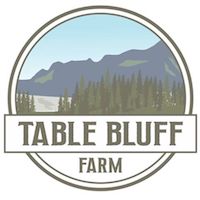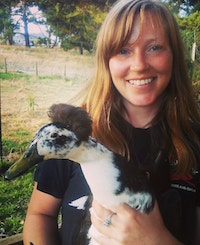What is Homesteading? An Interview with the Owner of Table Bluff Farm
“Live in each season as it passes; breathe the air, drink the drink, taste the fruit, and resign yourself to the influence of the earth.”
Henry David Thoreau, Walden
To anyone caught up in the jagged gears of modern capitalism, leaving the rat race and becoming entirely self-sufficient is very appealing. There’s a beauty in returning to our earthbound roots, trading the glow of a computer screen for a radiant sunrise and living by the land’s clock—plowing, planting, pruning, and harvesting. Even the Silicon Valley these days is hip to gardening and views owning chickens as a “status symbol.” Who knew that farming could be so cool?

But for some, growing one’s own food and raising animals is much more than a trend. Hannah Eisloeffel, the co-owner of Table Bluff Farm, says that homesteading is a lifestyle and it is her ultimate goal: “Our plan is to make a completely sustainable farm with vertical hydroponic garden—and aquaponic, as well, with the fish—and make it a totally closed system.” Piece by piece, she and her partner Nic have been cultivating 2.5 acres of land in Loleta, California, an unspoiled coastal region of Humboldt County. They have goats, pigs, quail, ducks, chickens, and a large vegetable and flower garden. And this is only the beginning of their journey into establishing a homestead.
So what is homesteading? It really depends on whom you ask. Some people embrace total self-reliance out of economic necessity or a survivalist instinct to prepare for the worst, while others view it as an almost spiritual ethos, a desire to reconnect with what’s essential in life and to know exactly where one’s food comes from. It looks different to each practicing homesteader and typically involves some or all of the following:
- A rekindling of forgotten wisdom about how to live off the land
- A focus on sustainable, non-wasteful producing (rather than consumption or materialism)
- Tending to a garden, foraging, and canning goods seasonally
- Engaging in animal husbandry
- Trying to use only renewable sources of energy (e.g., solar, wind, hydro)
- Finding satisfaction in simplicity, frugality, community, and living in the moment
While Ms. Eisloeffel and her partner view homesteading as an aspiration and modestly refer to themselves as “farmers,” to me—a city-dweller—they have already made it. Buying the land, creating an idyllic home, and tending to over 140 animals and a large garden are a real commitment to a lifestyle of self-sufficiency, even if they still pick up a few essentials at the grocery store.
These days, there are many shades of homesteading. Morning Chores, one of the countless blogs dedicated to this lifestyle, points out that there can be homesteads in apartments or small dwellings in addition to the traditional, large homesteads. Other blogs such as The Tiny Life argue that homesteading is more of a state of mind rather than a physical reality since there are so many ways of embracing the philosophy.
People also have different reasons for returning to the land. Ms. Eisloeffel stated that she and her partner take issue with the way livestock are treated and they want to raise meat in a humane way. She also prefers a barter-based financial system and she wants to grow her own food so she can live in a healthy, environmentally responsible way.
Other reasons people cite include:
- Chronic disease (i.e., wanting to remove the artificial and over-processed parts of modernity so they can heal)
- Religion and/or a desire to homeschool one’s children
- A frustration with modern production and consumption systems

I interviewed Hannah Eisloeffel of Table Bluff Farm to learn more about her decision to pursue homesteading, the lifestyle’s greatest challenges, and her advice for others who want to follow in that path. I have a lot of respect for Hannah. Most people do not have the courage to follow their most deeply held convictions. To paraphrase Thoreau, she has envisioned her dream castle in the sky and is now building its foundation. What could be more noble than that?
This transcript from early 2018 has been lightly edited for length and clarity.
BustedCubicle.com: When people ask you what you do for a living, would you call yourself a homesteader or would you describe it differently?
Hannah Eisloeffel: I would describe myself more as a farmer and then I would go into more details. My partner and I are trying to homestead, but right now we aren’t at that point. I’m not baking bread and growing my own grains. I feel like we’re doing some pieces of it and we’re aiming to be as off the grid as possible eventually. We have humble beginnings.
How would you describe the extent of your self-reliance right now?
It was a big deal when we didn’t have to buy chicken anymore at the store. We started raising our own meat chickens and we learned from a local traveling butcher how to humanely slaughter them, so we’ve just been doing that—eating our own chicken and giving them to friends and family. We are going to be raising up pigs for meat which we’ve done in the past as well.
My partner, Nic, is tractoring and plowing the field. We also used our pigs to plow some of it, but they don’t go as deep as a tractor can. We’re also putting in our garden and hoping to get to the point where we’re not buying any vegetables at the store except for things that won’t grow here.
I don’t see us getting to the point of making our own bread, but that’s not part of our goal. We have a bigger issue with things that are raised in a way that we can’t control when we buy them at the market, such as the way animals are treated. We want to do that in a humane way.
What kinds of vegetables and other things do you grow?
At different times of year, we have various herbs, kale, chard, lettuce, spinach, onions, potatoes, tomatoes, broccoli, cauliflower, romanesco, cucumbers, zucchini, winter squashes, and brussels sprouts. We also want to do cut flowers. Our plan is to grow beautiful flowers that people would want to buy in a bouquet at a farmer’s market or directly from us.
Where did you and your partner gain all of your knowledge? Did either of you grow up growing your own food?
Nic spent a lot of time on an 800-acre ranch down in Mendocino that his grandparents still run. He grew up just a couple hours away. His grandfather raised sheep so he was involved in that process. They also grew grapes for wine and we still help with that harvest.
He also has run a couple of gardens and grown them up from nothing—homeless garden projects and stuff like that—so he’s very good with vegetables and knowing when to plant what, and we’re both really learning the animal part. I’m learning it all and I’m loving it. It’s always what I’ve wanted to do.
Can you describe specifically what your setup is?
We live in Loleta, California, which is right next to the Humboldt National Wildlife Refuge. It’s a beautiful spot. It’s 2.5 acres and we’re on top of a hill in the coastal zone. It’s not affected by tsunamis or anything like that. It’s mostly pastureland that had horses on it in the past and it’s never been farmed before.
In terms of animals, we have 60 or 70 chickens, and we’re hoping to get more because they’re really easy to take care of and they lay eggs really well. We sell the eggs and we basically can’t keep up with the sales. Our seller has told us we can bring in a hundred times more than we’re bringing in, and they still wouldn’t have enough to meet demand!
We have around 50 ducks and we’re also trying to sell their eggs. Ducks are a lot more finicky and it’s tough to make them satisfied enough to lay eggs. We’re kind of just experimenting with them. We also have quail and we’re selling their eggs at the store. It hardly takes anything for them to lay.
We have a few goats which we use to eat back a lot of the foliage on our property. Right now we have nine pigs and two of them are pregnant and should be having piglets at the end of the month, so we’re getting prepped for that. The litters range from eight to 14 pigs per litter, so we’re looking to have a lot of pigs pretty soon.
At your farm, do you have internet, plumbing, and other amenities?
In Loleta, it’s been a struggle to get high-speed internet. We have this little self-generating My-Fi box. It’s pretty slow though. We make it work with what we have.
Speaking of the area, have there been any laws or government regulations—anything that’s been tough to navigate—or would you say where you are in a pretty welcoming place for that lifestyle?
It’s been a little tough to get in touch with folks about becoming an official, actual business. We’ve called a couple of organizations and left messages. People are on Humboldt time up here, so they really don’t get back to you.
Our plan is to make a completely sustainable farm with vertical hydroponic garden—and aquaponic, as well, with the fish—and make it a totally closed system. We would qualify for a lot of grants that encourage people to do that kind of thing.
Also, other farmers have been amazing. They’ve been completely open with information and they don’t see you as competition. Older farmers and ranchers are excited to see young folks taking up the reins. We’ve had a lot of support.
You mentioned you have a full-time job, in addition to running the farm. What do you do?
I am the donor engagement coordinator at Humboldt Area Foundation, which is our local community foundation. We are the main grantmakers of the community. We have a lot of nonprofits and deal with social issues in the community. I’ve been working here for about a year-and-a-half.
They say that if you want to be a successful farmer, if you’re a couple, one of you has to have off-farm income because farming is so seasonal. For example, you can have a chicken molt where you’re going along strong and all the sudden there are no eggs. So for a couple weeks, you don’t have eggs and if that’s a couple hundred dollars for you, where are you getting that money in the meantime?
I’m working about 40 hours a week and Nic works full-time on the farm. He was doing some tutoring at the local junior college as well, but we’re getting to the point where he pretty much needs to stay on the farm because there’s just so much going on.
How many hours would you say you put in per day on your farm?
With the actual farming and business side of it—keeping track of all our purchases, expenditures, and income—I’d say probably about three hours a day. And then on weekends I would say more like six.
What is the most tedious task? The most enjoyable?
The most tedious task is the water system. Right now we have big seven-gallon water containers that all the birds drink out of, but we don’t have spigots all over the property. We’re having to lug water all over the 2.5 acres. It doesn’t help when pigs have a tendency to just flip their water over! We’re actually in the middle of putting in self-contained water systems.
For the two pregnant pigs that are in the barn, we have a steel hose that is coming out of the spigot nearby. That’s basically an on-demand water system so they don’t have anything that they can flip. It’s like what you would have for a hamster, what they call “water nipples.” They’re pig-proof and they just use those whenever they want water.
We’re also putting in water-catch barrels that will be part of a gravity feed water system wherever we have an enclosure for animals. That way we’re catching the rain. During the really dry months, we’ll have to run a hose down there and fill up the bucket, but on an everyday basis, not having to lug water everywhere will be amazing.
The most enjoyable task…I just love so much about it! I love the moments where I look out the window of the house and there’s something hilarious going on with the animals. Maybe the chickens are chasing one of the birds around that has something particularly tasty in its mouth, goats getting into things…
We have a livestock guardian dog named Farmer and he’s still a puppy. He gets into all sorts of shenanigans. My favorite part is just being able to have those small moments of when things might be crazy in life, but you do get those moments on the farm of, “Oh, yeah, that’s why I do this.”
I also love bringing the eggs to the store because the dairy guy at Eureka Natural Foods says they can’t keep the eggs on the shelf. Everyone talks about how beautiful they are and how good they taste. It’s nice to have that outside recognition of all of our hard work because we can only talk to each other so much about how beautiful the eggs are!
Is your ultimate goal to be a homesteader or is it a little bit different?
Yeah, that’s our ultimate goal. If we’re able to grow our own food and take a lot of grocery shopping out of the equation, we would feel really good about that. There was an opportunity for me to advance my position here at the foundation to a director. I decided not to apply for it because my priority is the farm. I don’t want to tie myself to having to travel around a bunch of places and attending a lot of after-hours functions when I really would just rather be at home at the farm. I just need to keep going with what my gut tells me.
Yeah, that’s really admirable. There are so few people that really live their lives in alignment with what they really want. And I’m curious, who or what have been your inspirations for this kind of lifestyle?
I read Barbara Kingsolver’s Animal Vegetable Miracle in high school or early college and I wanted that life. I wanted to have enough money to be able to do what she did and drop everything and just start homesteading for a year and just eat only the things produced on a farm. She was brand new to it all and it was in a place that snows a lot, so I feel like they had it a lot harder and were able to make it work.
I’ve also always just loved a barter-based financial system. For example, you don’t have to raise all the animals because if you raise pigs and I raise cows, then I’ll trade you a cow for a couple pigs for the year to fill your freezer. That way we all help each other out and are kind of dependent upon each other. I love that sense of community.
From 2010 to 2013, I worked at an online holistic college called the Hawthorn University, which is based in southern Humboldt. We had administrators, teachers, and students from all over the world. I was the registrar and I took in all of the applicants’ personal statements and transcripts. So many people wrote and said that food was the thing that had cured them of their ailments. Whole foods vs. processed foods, and other aspects.
When I worked there, I thought, wow: if I could be in a position where I could grow my own food, not only would I be living my life in the environmentally friendly way, but I would also be incredibly healthy. So that was also a big inspiration, and I’ve always been a huge animal-lover.
What advice would you give to aspiring homesteaders? Any books or other resources?
There’s definitely a lot of information to be found online, but I would say that there’s a lot of misinformation too, so I recommend people really visit reputable sites. UC Davis in particular has a lot of agricultural information that is top-notch and based on scientific research.
In terms of advice, I would say that it’s hard and you are going to make mistakes. You have to just keep with it. We’ve made tons of mistakes, but we’re eating and selling the things that we’re producing. And don’t be too hard on yourself! Mistakes are all a part of this learning process.
Also, it’s really important to listen to your gut. When you’re doing something that’s this connected with nature, it’s definitely a time to tune in more to your internal instincts. I’ve never noticed the seasons as much as I do since I’ve been farming… and the light. It’s almost automatic.
Another thing I would say is you have to make expenditures on Mother Nature’s schedule. For example, either you need to rent a tractor to plow your field because this is the time that it has to happen or you’ll have to wait another year to plant those vegetables. If this is really what you want to do, your hard work will pay off.


